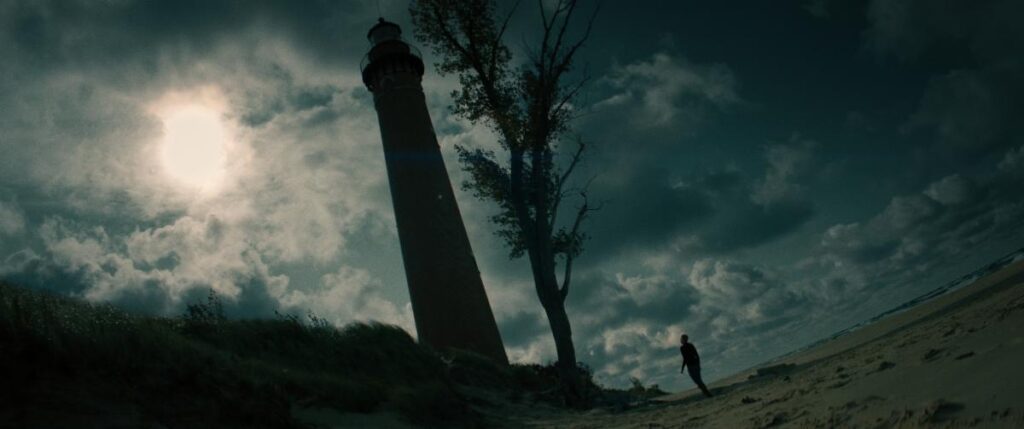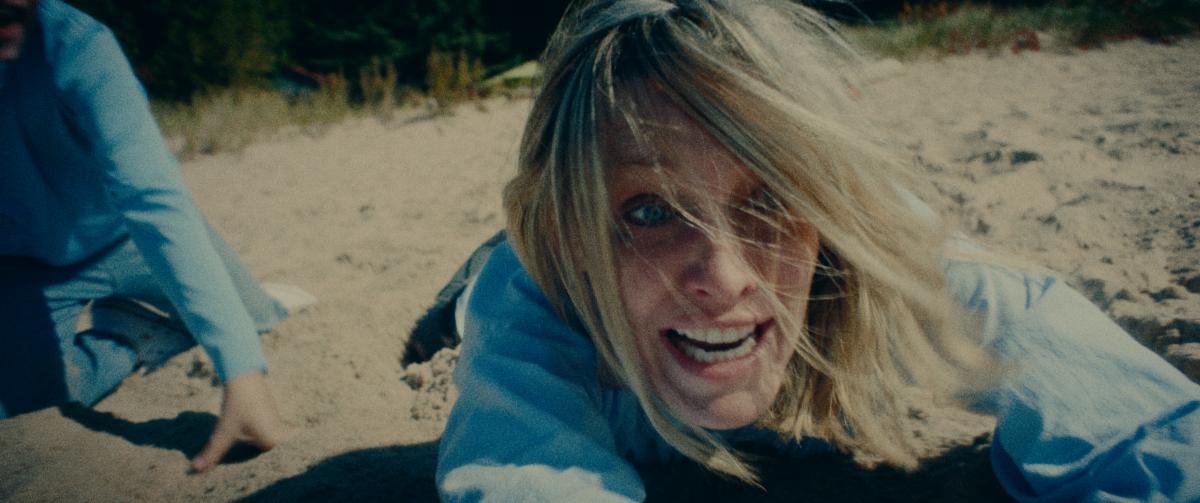
A wonderfully desolate beach and the surrounding countryside clash with a ramshackle nearby house and its sole occupant (Nick Searcy), whom we see frantically writing – against the clock, as some kind of supernatural phenomena seems to be goading him, making him hallucinate, fear for his sanity. So who is this letter for? We get a brief gap in the timeline, but we can quickly infer that it’s for the man’s son Tom (Tyler Q Rosen), who receives a call late at night to tell him the worst (though given the remoteness of his father’s house, who knows who makes the call; oh, wait. Is this part and parcel of the strange circumstances which ensue?)
Thus begins a troubled quest for knowledge which, it seems, Tom always knew was coming. But it’s not a straight path to get to this point: along the way, we pick up a few more characters. There’s counsellor Jess (Adriana Isabel), Tom’s sister-in-law, first seen facing down an angry ex-con who doesn’t buy into self reflection, sharing his feelings or the meditation prescribed as part of his probation. In fact, he hates it so much, he can barely restrain himself from launching at Jess, whether she has just decided to share her own story or otherwise. Jess is, by her own admission, damaged; she also has the double jeopardy of a bit of a doofus at home, her husband Mark (Oscar Wilson). Mark spends a lot of the screenplay pondering the functionality of his smartphone: it’s not a winning trait, especially when he and Jess end up taking his distraught sister Kathy (Sara Fletcher) to the lake house in pursuit of Tom, who headed there to clear up his father’s affairs and – hasn’t been heard of since. This is a worry, and not just because Marks’ phone won’t work out there…
We know that Tom received his father’s letter, and that it contained a fairly standard mea culpa about the breakdown in their relationship – but also more, information which is carefully withheld from the audience. It’s enough to precipitate some very erratic behaviour from Tom, though, which his family see when they track him down. He is angry they’re there, telling them they need to leave – the lake, he avows, is a strange and dangerous place, which calls to him.
In essentials, the plot here is familiar: there’s a dark, dangerous and supernatural generational burden, and to know it is to suffer it. However, the ways in which The Dæmon brings this to the screen is effective and in places, innovative. Tom, the first focus of this unfolding strangeness, is portrayed well as a man enduring a dark, lonely ordeal. There are no long speeches from him and no super-convenient backstory, save for a brutal and unexpected flashback, counterbalanced by increasingly unpleasant and bizarre pay-offs in the here and now: what we get is a man genuinely grieving for the life he wishes he could have lived.
The focus shifts and moves, however, with each member of the group undergoing their own lonely ordeal, or else suffering because of the loneliness they each brought with them. The film shifts from intense, questing and lingering long shots of each individual, to evocative shots of the nature around them: it’s an intriguing blend, and beautifully shot throughout. Scrub any notion of supernaturalism from the film, and you would still be left with a sense of forces older and stronger than us – the environment, the water itself. But of course, there is more going on here: as this comes to the fore, the film can boast some unsettling effects, a little hamstrung by the CGI used perhaps, but still effective. There’s no argument with the accompanying soundtrack, however, which builds and maintains a thrumming, uneasy level of tension throughout; lighting and framing are excellent, too.
If there’s one main issue with The Dæmon – which, come to think of it, is a mysterious and unexplored title – it’s that the eventual payoff is strongly reminiscent of…the work of a certain, seminal horror author, and were I to name him, it would likely give the game away (if you aren’t already guessing about what possible supernatural horrors could be lurking beneath the depths of the lake). That’s all fine, except it rather invites audiences familiar with this particular storyteller (most of us, at a guess) to fill the gaps for themselves, taking that honour away from directors/writers Matt Devino and David Michael Yohe, who are content to leave us to it after providing a couple of clear signposts. However, even allowing for this, this is an engaging and often creepy, disconcerting film which generally provides a colder, grimmer spin on its brand of cosmic horror – albeit with some incredible, contrasting flashes of colour, and a nerve strong enough to leave us with some manner of ambiguity.
The Dæmon (2024) features as part of this year’s Pigeon Shrine FrightFest.
